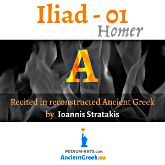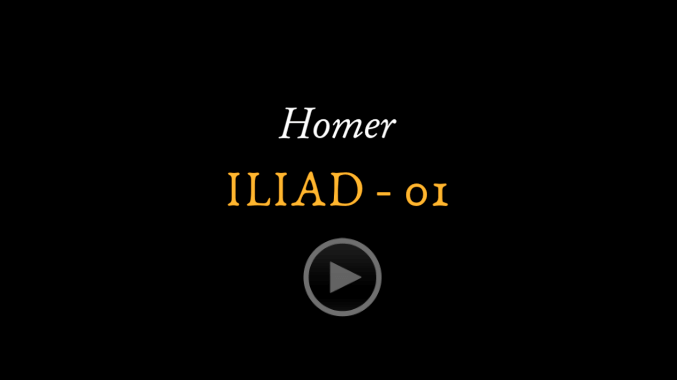• Iliad 01 •
• Homer •

Duration: 53 min
Unabridged
Recorded: 2024
Price : $/€ 35 (audiobook) - 50 (videobook)
About rhapsody 01 of the Iliad
The first rhapsody of The Iliad opens with the epic’s central theme: the wrath of Achilles. The story begins in the tenth year of the Trojan War. The Achaeans (Greeks) are struck by a deadly plague, sent by Apollo, in response to Agamemnon’s refusal to return Chryseis, the captive daughter of Apollo’s priest, Chryses. The priest had offered a ransom, but Agamemnon stubbornly rejects it. When the plague devastates the Greek army, Achilles calls for a council to find a solution. The seer Calchas reveals that the plague is Apollo’s punishment for Agamemnon’s actions.
Reluctantly, Agamemnon agrees to return Chryseis but demands compensation, threatening to take Achilles’ war prize, Briseis. Enraged, Achilles nearly kills Agamemnon but is stopped by Athena, who urges restraint. Achilles surrenders Briseis but withdraws from the fighting, vowing not to fight until the Greeks realize how much they need him.
Achilles’ withdrawal sets the stage for his growing anger and the suffering it brings upon the Achaeans. Achilles prays to his mother, Thetis, asking her to persuade Zeus to help the Trojans as a means of punishing Agamemnon and proving Achilles’ importance. The scene shifts to Mount Olympus, where Thetis pleads and successfully persuades Zeus to help the Trojans.
The first rhapsody of The Iliad ends with a quarrel between Zeus and Hera after Zeus agrees to support the Trojans, angering his wife. Hera accuses him of plotting in secret, but Zeus asserts his dominance and threatens her. Their son, Hephaestus, intervenes, urging his mother to submit and avoid further conflict. He humorously recalls how Zeus once threw him from Olympus for defending her, easing the tension. The gods laugh, enjoy a feast, and end the day peacefully.
Homer
Though Homer doesn't need an introduction, in case you'd like to refresh your knowledge about his life and work, you can read enough in published books, or online by consulting websites like: the Center for Hellenic Studies of Harvard University (using their search field), Encyclopaedia Britannica, the "Living Poets" website, even Wikipedia, Biography.com, or elsewhere.
About the audiobook
 The recording contains the unabridged Ancient Greek text of the 1st rhapsody.
The recording contains the unabridged Ancient Greek text of the 1st rhapsody.
This recitation is trying to find a balance between dramatisation and metrical correctness. I've avoided excess on both sides: not to render it as mechanically rhythmic as it usually happens in educational context on all levels and, not over-dramatise it, as is often needed in live performances in larger venues. I hope this is a proper approach for this medium.
After purchase you will be able to download the relevant mp3 file (audiobook) or .mp4 + .srt (videobook + captions)
You can listen to a short sample in the following video.
